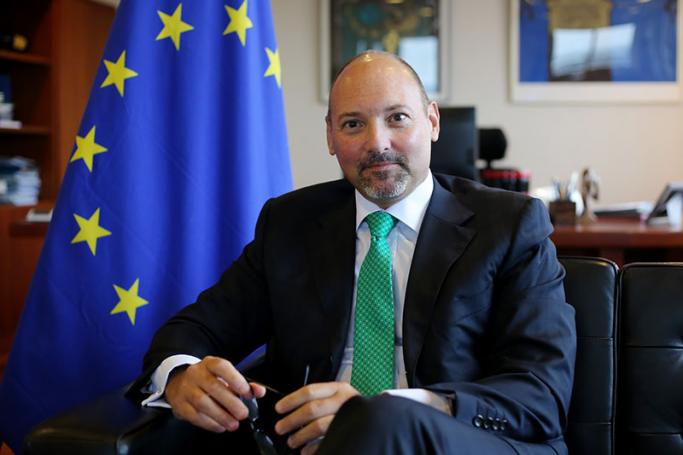by Aveek Sen
With the Trump administration in a mad dash to exit Afghanistan, most of its partners are left confused, including Afghanistan, the European Union (EU), and India. The EU has hinted multiple times that its approach to peace is different from that of the United States. Afghanistan, too, has been critical: Afghan National Security Advisor Hamdullah Mohib publicly slammed U.S. envoy Zalmay Khalilzad over his approach to the peace talks. Mohib said that the Afghan government has been kept in the dark about the progress of the talks.
EU Special Envoy for Afghanistan Roland Kobia, who was recently on an official visit to Tehran for political consultations, met several officials at the Iranian Foreign Ministry. All of these meetings focused on the Afghan peace talks. Kobia also met the Indian Joint Secretary Deepak Mittal to discuss peace in Afghanistan and regional trade. India, Iran, and Afghanistan are all developing Iran’s Chabahar port. Kobia tweeted, “While some want to exclude and play negative cards, the EU tries to include.” The differences between the EU and the United States over who sits at the table at the peace talks have been simmering for a while.
Afghan President Ashraf Ghani is ready to talk to the Taliban, but the Taliban doesn’t want to talk to the government in Kabul. Also, India has not held any meetings with the Taliban as it believes that it should first talk to the Afghan government. However, seeing the situation moving rapidly in favor of the Taliban, India sent an unofficial delegation of retired diplomats to Moscow to talk with Taliban representatives in November last year. Both Afghans and Americans have alleged multiple times that Iran has maintained contacts with the Taliban. Last year, the secretary of Iran’s National Security Council finally admitted this to his Afghan counterpart.
The Taliban now controls nearly 60 percent of Afghanistan’s territory. So, Iran wants to make sure that it can use its leverage with the Taliban to its advantage. At the same time, Iran is probably feeling a bit left out of the Afghan peace talks, says Ali Vaez, director of the Iran project at the International Crisis Group. Given the critical national security implications of this process for Tehran, Iranian leaders are seeking ways to protect their interests and that includes negotiations with the Europeans.
Meanwhile, Moscow hosted a tripartite consultation on Afghanistan with the United States and China attended by Khalilzad. The United States has coordinated to a large extent with Russia on the talks, but not with other partners, who are confused about the timeline and the scale of withdrawal. Although Khalilzad publicly stated last November a deadline of April 2019, the final deadline for withdrawal will be the Afghan presidential elections in September 2019.
Another concern is whether the United States and EU will financially support Afghanistan and its army after any peace deal with the Taliban. In the absence of stable state institutions, a civil war may well ensue with warlords vying for control of resources in a large-scale inter-ethnic conflict. The Taliban may target ethnic groups like the Shia Hazaras or the Sunni Tajiks.
The United States, with its America First policy, has not taken the initiative to get its partners onboard to negotiate with the Taliban or secure a stable post-war Afghanistan. As a result, the EU, Iran, and India are coordinating their policies so that they are not left out in the cold after whatever deal emerges in Afghanistan.
Aveek Sen is an independent journalist working on cybersecurity and the geopolitics of India’s neighborhood, focusing on Pakistan, Afghanistan, Iran, and Bangladesh. @aveeksen.






As the US intervened in Afghanistan, once again it failed to appreciate what a safe rear on the other side of the border can mean in such a war. Pakistan proved to be rather dissociated from America’s struggle, though it’s economy would collapse much as has America’s war against the Taliban. But the US tried to have irs cake and eat it too with very sad consequences to both its entry and exit from the war. It all proves once again that before getting into a war US leaders ought to consider the consequences. It also should consider how much success is worth, and if not attainable, what will it do with those who threw their lot with the US. American alliances will draw profound long term lessons from this closing of a war as it did from Vietnam and the effect will be cumulative. The issue now is who are the Taliban leaders of tomorrow. The West can’t limitlessly absorb refugees from every war where it creates a bloodbath and then pulls out. Europe has suffered invasion from the Israeli-Saudi attempt to overthrow the Syrian regime by over three million refugees. Who will absorb the millions from Afghanistan? No longer a bipolar scary nuclear world we are one where the most myopic of local struggles create massive population flaws. And always, immature American Presidents with very little sense of anything than egocentric sense of what looks bad and what looks good are investing unimaginable firepower in far off countries only to stalemate the situation after immense bloodshed and then pull out, permitting an even greater bloodbath of those who had faith in America’s word. I am utterly flabbergasted having seen in three times in my life. A discussion above President Trump’s cacophony is well in order. I just hope it’s not too late. The world is large indeed but never that large that we should consider anything as too far away to think about it.
Shoot first, then ask questions about the consequences of your actions! This has become the MO for the US and unfortunately some of the local police forces are following this method!